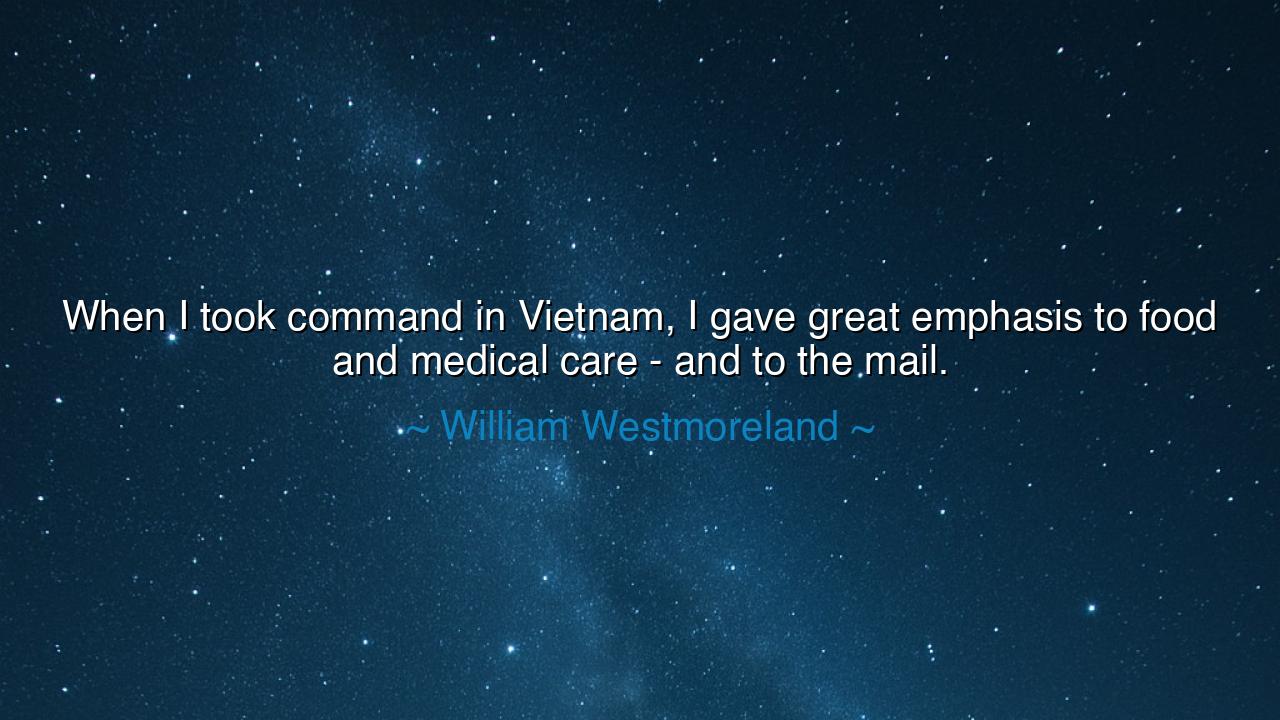
When I took command in Vietnam, I gave great emphasis to food and
When I took command in Vietnam, I gave great emphasis to food and medical care - and to the mail.






Hear the words of William Westmoreland, commander of men in a distant and troubled war: “When I took command in Vietnam, I gave great emphasis to food and medical care – and to the mail.” These words may sound humble, simple, even ordinary; yet within them lies the wisdom of leadership. For he understood that victory in battle is not wrought by weapons alone, but by the strength of the human spirit. To nourish soldiers with food, to preserve them with medical care, and to remind them of home through the mail, was to fight not only for the body, but also for the soul.
The meaning of this utterance is profound. Westmoreland reveals that in the chaos of war, survival depends not only on tactics and strategy, but on the care of the ordinary needs of soldiers. Food sustains their strength, medicine preserves their lives, and letters from home restore their hearts. To neglect these things is to allow hunger, disease, and despair to corrode an army from within. To honor them is to show respect for the humanity of those asked to endure hardship. Leadership is not merely giving orders—it is providing the foundations of life that keep men standing when the world crumbles.
The origin of these words is found in the jungles of Vietnam, a place where heat, exhaustion, and illness were as much enemies as the opposing army. Westmoreland, seasoned by battle, knew that soldiers fought better when they knew their commander cared for their welfare. By emphasizing food, care, and mail, he sought to shield them not only from physical weakness but from loneliness and despair. His quote, born from the crucible of command, reflects the ancient truth that an army marches not only on its feet, but on its spirit.
History confirms this lesson. Consider the tale of George Washington at Valley Forge, when his army shivered in hunger and despair. It was not brilliance in battle that preserved the Revolution that winter, but the provision of food, the tending of the sick, and the encouragement of letters and words from their leader. Washington, like Westmoreland, understood that victory begins with care for the soldier’s humanity. Armies collapse when their men are left starving and forgotten, but endure when they are nourished in body and spirit.
The emotional force of Westmoreland’s words lies in the mention of the mail. For while food and medicine sustain the body, letters from home sustain the heart. A soldier who receives the words of a loved one carries more than paper—he carries the strength of memory, of belonging, of hope. In the darkest jungles, surrounded by fire and fear, a letter becomes a light, a reminder of why one fights and what awaits beyond the battlefield. By emphasizing the mail, Westmoreland showed wisdom: he understood that victory is won as much by morale as by arms.
The lesson for us is clear: whether in war or in peace, true leadership is found in care for others’ essential needs. In workplaces, in families, in communities, people thrive not when they are pushed beyond breaking, but when their most basic needs are honored: sustenance, health, and connection. To lead is to feed, to heal, and to remind others that they are not alone. This is as true in daily life as it is in the command of armies.
Therefore, let your actions reflect this wisdom. Provide nourishment where there is hunger. Offer care where there is weakness. Share words of encouragement—the “mail” of daily life—where there is despair. Do not underestimate the power of small acts, for in them lies the strength to endure great trials. For it is not always the sword or the strategy that sustains a people, but the compassion that meets their simplest needs.
And so, remember the teaching of William Westmoreland: leadership begins with care. The soldier’s strength, the worker’s spirit, the family’s harmony—all depend upon food for the body, healing for the wounds, and words that keep the heart alive. To forget these things is to invite collapse; to honor them is to build endurance that no trial can destroy.






AAdministratorAdministrator
Welcome, honored guests. Please leave a comment, we will respond soon